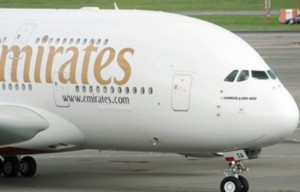
(AFP Photo)
Gulf Business magazine recently released its list of 100 most influential people in the Arab world for 2013. Those that made the list covered a number of sectors; however most could be found working in finance, real estate, science and technology, society and culture, and commerce.
Emir Walid bin Talal bin Abd al-Aziz Saud, president of the Kingdom Holding Company, was named the most influential person of the year. Ahmed Bin Saeed al-Maktum, president of Emirates Airline, placed second, while Khalid al-Falah (Saudi), president of Aramco, came in third. He was followed by Muhammad al-Madi, the Saudi president of Sabic.
Muhammad al-Abar, the Emirati president of the international commercial and real estate company Emaar, was named the fifth most influential person, followed by Muhammad al-Aryan, the Egyptian-American president of Pimco. Ahmed Muhammad al-Sayyid, president of Qatar Holding, was seventh, with Brazilian-Lebanese President of Renault Nissan Carlos Ghasan placing eighth. Saudi Arabian Human Rights activist Warim Assad was named the ninth most influential person of the Arab world.
Saudi Arabia, the UAE, Qatar, Kuwait and Egypt are listed as the region’s most influential countries….the importance of science and technology has increased, serving as the foundation for future development in the Arab world.
For the second year in a row, Gulf Business sought to promote the significance of science and technology sector within the Arab world, over that of finance, real estate, commerce and investment. Science and technology has been considered one of the strategic foundations upon which development will occur in the Arab world in the future, carrying with it the potential to create jobs and raise incomes, particularly in nations that suffer from high rates of unemployment.
This year, seven personalities from the science and technology sector were featured on Gulf Business’s list of top 100 most influential figures in the Arab world, as opposed to five in 2012. Charles al-Ashi, a Lebanese-American technology specialist placed first in his field, and 29th on the list as a whole (this is compared to 17th in 2012). Egyptian Marsi Harb, one of the leading pancreas and diabetes specialists in the Middle East, placed second in his field and 37th on the list as a whole; Harb also currently serves as the president of the International Diabetes Federation for the Eastern Mediterranean Region. He was followed by Hayah Sandi, a Saudi medical researcher.
Emirati Abdullah Abd al-Aziz al-Nagar, president of the Arab Science and Technology Foundation, placed fourth as the most influential in his field, and 42nd on the list as a whole, compared to 43rd in 2012. Al-Nagar is noted for his support of special research activities in the region that have succeeded in attracting investment from all over the world. He is also praised for making sustainable economic development a pillar of his innovation and research. He was followed by Saudi Samia al-Amudi, an activist in cancer research, who placed 76th on the list as a whole compared to 79th in 2012.
Al-Sir Magdi Yaqoub, a British-Egyptian heart surgeon, placed 80th on the list, moving up 17 places from last year when he placed 97th. Faruq al-Baz, an Egyptian-American and director of the Sensory Centre of Boston University, placed 95th on the list, moving back 55 places from 55th in 2012.
The rates of influence by sector go as follows: finance 27%, industry 14%, society and culture 13%, real estate 7%, science and technology 7%, energy 7%, media 6%, transportation 5%, retail commerce 4%, government Sectors 3%, communications 2%, politics 1%, and education 1%.
With regards to rate of influence by country, the list is as follows: Saudi Arabia 28%, UAE 19%, Qatar 12%, Kuwait 10%, Egypt 6%, Lebanon 4%, Palestine 4%, Syria 4%, other countries (this includes Arabs living in the United States, United Kingdom, Brazil and Australia) 4%, Bahrain 3%, Iraq 2%, Jordan 2%, and Oman 2%.
23% of the top 100 most influential figures in the Arab world were women.
Last year, Gulf Business named Muhammad Boazizi, the Tunisian vegetable vendor who sparked the Tunisian revolution, as the most influential person of the year.




